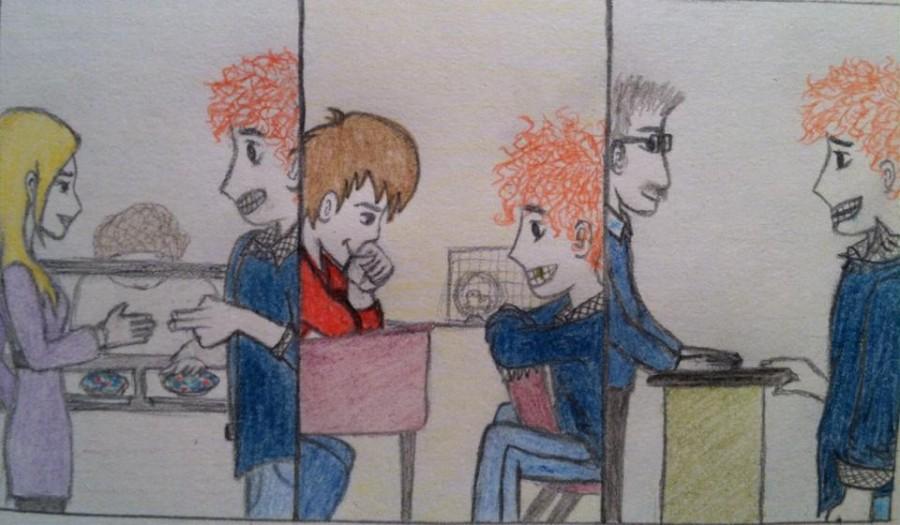People’s Prism: Introductions are funny things
October 30, 2015
Weston, a 28-year-old graduate student, is all too familiar with introductions.
When Weston meets new people, it can easily be compared to the motion of riding a flying saucer down a snow hill the size of those giant Icees every ‘good’ gas station has. Sometimes the social dynamics click instantly for Weston, and he is able to slide along the snowy slope contently and keep a good conversational atmosphere while minimizing social abnormalities. If his introduction is not so great, the bumps felt on the ride down are only prolonged moments of awkwardness and discomfort for Weston.
The following are examples of Weston’s introduction experiences:
At lunch, Weston strolls into the college’s cafeteria and passesthe pile of what looks like last year’s broccoli special. Bumping the tray of the woman in front of him, he makes his first introduction attempt of the day. Distracted by the server inquiring which salad portion he would like, he pulls his left hand outright, slightly sweeping past this woman’s blond forearm hair—realizing that he chose the wrong hand for a now awkward introduction.
Momentarily, the woman’s eyebrows curiously fluctuate, thinking of a polite response. Deciding which side of Weston’s left hand to grasp first, the woman clutches two of Weston’s fingers as he withdraws the remaining others.
Their conversation did not reach past the finger shake.
Later, Weston arrives late to his first class of the day. Chirping out a stumbling, “hi, hi, hello, hi” as Weston slides past the professor and into the closest seat available.
Blinking excessively, Weston hopes the movement of his lashes establishes confidence in his professor. His wishbone desire is to at least always look like his brain is absorbing everything the professor says.
Meanwhile, a tag displaying a size “M” from the back of his neck sticks its tongue out like two preschoolers debating whose crayon color is better.
Next, the professor gives the class five minutes to acknowledge the people sitting around them. Weston spins around and faces the stout, redheaded boy pretending to be mesmerized by the paper assignment on the table beside him. The green grains from lunch managed to wedge their way in-between Weston’s front teeth, vividly seen by his classmate.
Suddenly, the boy stops pretending to be interested in the assignment and releases a small chuckle like that of mini inopportune sneeze. Weston, wondering why his classmate is laughing, strokes the side of his head to remove the strand of hair clouding his vision.
Immediately, his classmate begins to laugh louder, as Weston’s hair follicles give way to humidity.
Now, his curly red locks are sticking out in all directions, as Weston continues smiling, unaware of the classroom’s humidity affect: basically, a male version of Ellie’s hair from the movie “Up” as she describes her adventure book in her childhood. Weston continues talking as his breath releases a stench smelling of a mixture between a pile of week-old, empty Red Bull cans and that runner’s dog you unconsciously pet but are too polite to vocalize its odor.
As Weston goes about his day, his introductions do not end. Winded and in hurry, Weston’s first errand is a stop at the bank. The teller at the counter greets Weston as he proceeds to inquire his needs. As the first few words leave Weston’s mouth, so does his saliva.
Weston, acknowledging the nasty aspect of this accident, sees that the saliva droplet lands on the teller’s side collar, as if his mouth acquired a tiny bit of Spiderman’s web-casting ability. Weston internally gasps. In his mind he says to himself, “Do I go wipe it off, ignore it or allow the customer behind me to think it is theirs before it dissolves?”
Weston chooses his second mental option and finishes his interaction with the bank teller.
Weston is my fictional protagonist. He is fake and the experiences described, while detailed in some extremes, represent awkward moments which we can relate to in reality.
If we ever face awkward situations (and of course, who hasn’t?) these moments are ways life gains a sense of humor when we reflect on our interactions, even beyond introductions.


